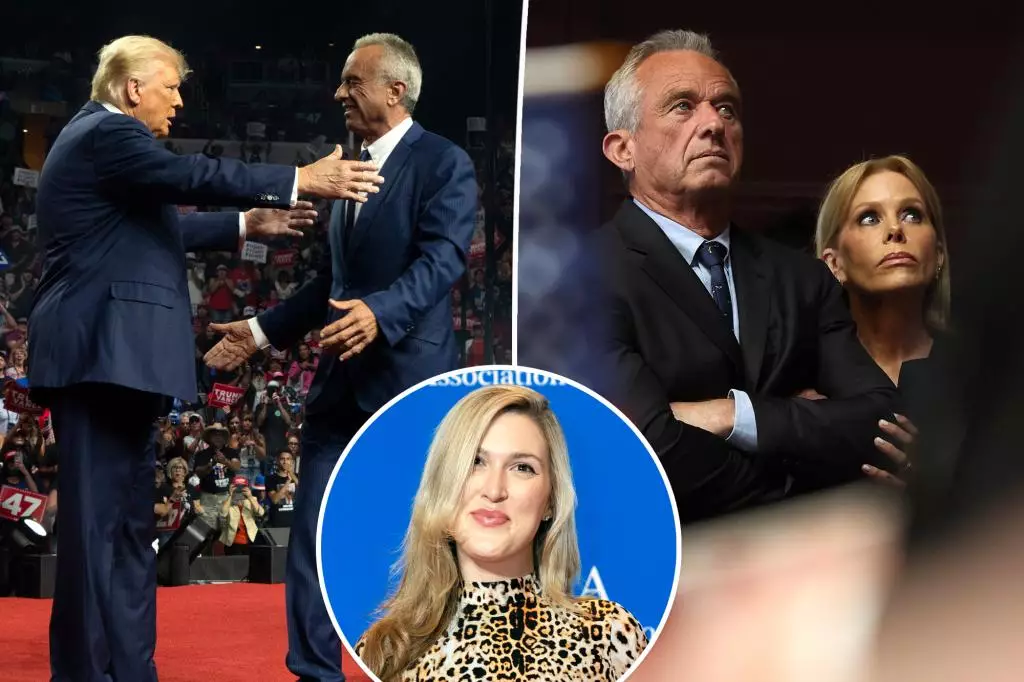In the complex realms of politics and public life, personal scandals often intertwine with professional aspirations, raising questions about integrity, accountability, and the public’s tolerance for private behavior. Recent events surrounding Robert F. Kennedy Jr. highlight this nuanced intersection. Following a reported relationship with journalist Olivia Nuzzi, the emergence of multiple allegations of affairs against Kennedy poses potential challenges to his political ambitions, particularly regarding his association with Donald Trump. However, insights from political insiders suggest that these controversies may have limited repercussions in the shifting sands of today’s political landscape.
A Scandalous Revelation: The Nature of RFK Jr.’s Alleged Affairs
The saga surrounding Kennedy began with revelations of a texting relationship with Nuzzi, prompting a cascade of claims from other women alleging similar encounters. While Kennedy has publicly denied any wrongdoing and insists that his only romantic commitment is to his wife, Cheryl Hines, the implications of these allegations extend well beyond personal relationships. Observers note that the nature of the interactions—described as intense yet non-physical—coupled with claims of “FaceTime sex,” notably complicate the narrative.
In political contexts, allegations like these can carry significant weight, often leading to a reevaluation of a candidate’s viability. However, reactions to Kennedy’s situation reveal a growing sentiment within the Trump administration that personal indiscretions may not be the political liabilities they once were. This evolution reflects the changing values within the GOP, as insiders note they are less inclined to scrutinize personal lives compared to previous administrations.
Reports indicate that Donald Trump is less concerned about Kennedy’s alleged affairs than about the broader strategic implications of his potential candidacy. Trump is known for his transactional approach to politics, often prioritizing loyalty and functionality over moral considerations. Insiders claim that as the former president seeks to consolidate power within his team, aspects like Kennedy’s personal life take a backseat to the pressing need for electoral success.
“Nobody in D.C. cares about this stuff anymore,” remarked one source, suggesting that political scandals have become a mere footnote in the race for power. The comment hints at a fearlessness in the political apparatus that could allow Kennedy to pivot back into favor, should he align with Trump’s campaign goals, regardless of earlier transgressions.
The Broader GOP Shift: Changing Standards of Conduct
The current climate within the GOP also speaks to a larger transformation regarding standards of conduct. As representatives of the party point out, they have shifted significantly since the days of George W. Bush, wherein probing questions about personal integrity held substantial significance. “We are not policing what people do in their bedrooms,” another source stated, asserting a cultural evolution within Republican circles that places a premium on results over reputation.
This attitude is likely fueled by a broader societal ambivalence toward politicians’ private lives, particularly as new generations of voters remain more focused on ideologically driven policies than personal ethics. The forgiving stance on Kennedy’s alleged indiscretions mirrors a similar leniency observed in Trump’s own narrative of surviving scandal after scandal throughout his career.
Despite the controversy, some analysts suggest that Kennedy could still carve out a role in the Trump administration if the right conditions are met. Discussions around his potential exclusion from significant roles due to security concerns—stemming from the possibility of blackmail from his past—could become moot if he seeks positions that do not require high-level security clearances. For instance, roles pertaining to health and public safety might still be achievable and strategically advantageous for both him and the administration.
Such outcomes could leave disillusioned voters questioning the propriety of electing leaders who seem insulated from the consequences of their actions. As Kennedy navigates this treacherous landscape, the overarching challenge remains: can he dissociate himself from these damaging allegations while staying relevant in the Trump-dominated political narrative?
Robert F. Kennedy Jr.’s recent controversies serve as a case study in the evolving dynamics of scandal and politics. As societal norms shift and political landscapes transform, it becomes increasingly complicated to draw comprehensive conclusions about what qualifies as disqualifying behavior for public officials. While Kennedy faces a whirlwind of allegations, the current political climate suggests that redemption may come in the form of loyalty, strategy, and an evolving understanding of public scrutiny. As the 2024 election campaign progresses, it will be fascinating to observe how these intertwined narratives unfold, impacting not just Kennedy’s ambitions but the broader conversation on political expectations in a post-truth era.
